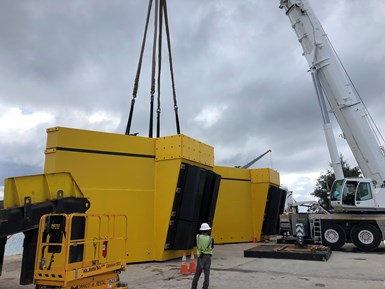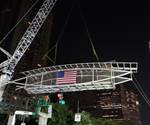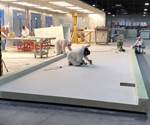
Source | Composite Advantage
Infrastructure maintenance posed challenges for U.S. Naval Base Guam (NBG) due to lack of services and support on the tiny western Pacific island. NBG handles submarine deployment for the 7th fleet and is home port to four Los Angeles-class attack submarines. External flotation structures called camels prevent damage to vessels and port structures when submersibles are berthed or moored, but conventional materials make them prone to high maintenance and frequent replacement. NBG found a solution with Composite Advantage’s (Dayton, Ohio, U.S.) corrosion-resistant, fiber-reinforced polymer (FRP) composite universal submarine camels (see more on the camels’ composite design).
“Metal and wood camels require removal every two years for inspection and repair which can be costly if corrosion has set in,” says Scott Reeve, marketing director for Composite Advantage, which is now part of the Creative Composites Group. “Poor durability was another problem. The FRP universal composite camel is corrosion resistant to salt water and chemicals, requires no maintenance, reduces life cycle costs and can accommodate any class of submarine.”

Source | Composite Advantage
A set of two FRP camels — 36 feet long, 18 feet high and 17 feet deep, weighing 70,000 pounds — each were fabricated in Composite Advantage’s Dayton, Ohio factory and shipped to Whittier, California in December 2019. The camels traveled 6,111 miles by ship to Guam, arriving January 13, 2020. Assembled at a Guam shipyard, the two camels were set in the water and tugged to the naval base where they were moored to the pier ready for use. Composite Advantage has been designing and fabricating FRP universal camels for the Navy since 2013.
Related Content
-
Award-winning Oder river bridge cuts 500 tons of steel with CFRP tension cables
Developed by Carbo-Link and tested by Empa, the Oder Bridge near Küstrin is a heavy rail bridge using 88 CFRP tension members, enabling 120 km/hr train speeds with reduced weight and emissions.
-
Premier Composite Technologies, Sicomin support Holy Mosque Mataf extension project
The Grand Mosque’s 216,800-square-meter Mataf ceiling demonstrates the architectural possibilities when using composites.
-
Custom FR epoxy, hybrid glass/carbon fiber composites enable massive mosque ceiling expansion
Premier Composite Technologies delivered more than 25,000 FRP sandwich panels to massive Great Mosque of Mecca expansion, meeting weight, fire and 10,000 units/month goals.


.jpg;width=70;height=70;mode=crop)











